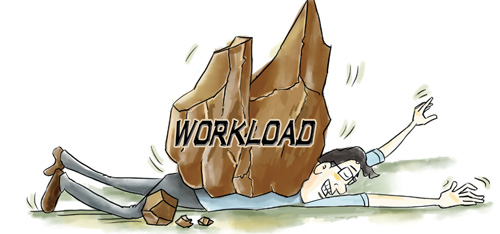|
 |
|
(CFP) |
China's young professionals have lost upward motivation compared with older generations as a result of career-related stress. According to a recent survey conducted by China Youth Daily, out of 4,155 white-collar workers surveyed, 51.5 percent believe that an ideal position is where one feels comfortable and can use his or her skills to the best and 46.9 percent believe that a promotion leads to more pressure and may disrupt the balance between career and life. Among the respondents, 65.4 percent were born after 1980.
Zhao Liyong, a young IT engineer working in the same company for six years, rejected a recent promotion offer as the manager of the company's technical department. "I won't be at ease at a managerial position. I prefer doing what I am good at. Moreover, the current job gives me more spare time," Zhao told China Youth Daily.
Zhao's prudence about climbing the corporate ladder may sound like a humorous inversion of the Peter Principle which states "employees tend to rise to their level of incompetence." But the toll on public health exacted by career-related stress in China is no laughing matter. Media outlets have reported many cases of young workaholics dying on the job or committing suicide as a result of occupational pressures in recent years.
Fatal stress
Xu Wenjun, 29, owned an online clothing store. The father of a 2-year-old daughter died suddenly while driving his car from a clothing warehouse. Xu's wife, who ran the store with him, said that her husband could not sleep at all on the previous night, worrying about a problematic batch of supplies.
In the early morning of October 21, Xu's wife spoke to her husband on the cellphone for the last time. "When I woke up, I found him gone. He told me on the phone that he was checking the stock at our supplier's place and he would be home by noon," she said. But at around 1 p.m. Xu was found collapsed behind the wheel of his car, parked at a highway exit.
The forensic report relating Xu's death to overwork and exhaustion came as no surprise to his family as he often worked after midnight to respond to buyers' questions and complaints online. His sleep-deprived lifestyle had lasted for more than four years ever since he opened a store on Taobao.com, China's answer to eBay.
In April, 2011, Pan Jie, an auditor at the Shanghai branch of PricewaterhouseCoopers, died suddenly at the age of 25. Although the company said that she died of viral encephalitis after a high fever prompted her to ask for sick leave, many people believed the tragedy stemmed from karoshi, a Japanese term that literally means death from overwork.
Work pressure has also become a leading cause of police officer fatalities in China. According to the Ministry of Public Security, overwork was behind the deaths of 47 percent of officers who died on duty from 2006 to 2011.
Some medical experts believe that the sudden deaths of many young workers, who appeared to be very healthy, are not so sudden after all. Instead, the enormous workload has forced them to ignore the signs of some critical illnesses.
According to a survey conducted by China Youth Daily on 4,027 people, 99.7 percent respondents said that they know young colleagues who choose to ignore signs of diseases and 58.4 percent said that the young generally don't take good care of themselves.
The same survey also revealed that when feeling ill, only 11.4 percent of the respondents would go to see a doctor immediately.
Lei Ming, a young professional of international trade, suffered from a mere flu virus that developed into a near-death experience. After suffering a prolonged cold at the end of 2002, Lei casually took some medicine but didn't take sick leave to seek professional care. Over time the cold developed into an inflammation of the muscles of his heart and an extremely rapid heart rate.
As a result of his conditions, Lei has to take heart medicine with him all the time and has been sent to emergency rooms four times this year alone. "Young people's sudden deaths have a lot to do with their lack of medical knowledge and many deaths can be discovered earlier and prevented," Lei told China Youth Daily.
| 